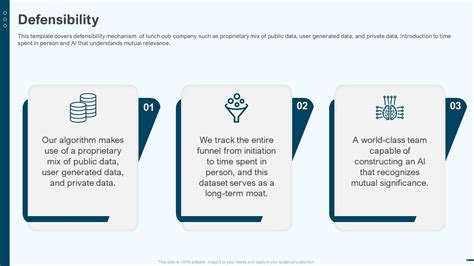Defensibility is a multifaceted concept that has garnered significant attention across various domains, including business, law, and cybersecurity. At its core, defensibility refers to the ability of an entity, whether it be a company, an individual, or a system, to withstand or counter potential threats, challenges, or criticisms. In the context of business, defensibility often relates to the strategic and competitive advantages that a company possesses, which enable it to maintain its market position and protect its assets. In legal terms, defensibility may pertain to the strength and validity of a defense in a court of law. Meanwhile, in cybersecurity, defensibility is about the capacity of a network, system, or application to resist and recover from cyberattacks.
Nature of Defensibility

The nature of defensibility is complex and dynamic, evolving in response to changing environments, technologies, and threats. In a business context, a company’s defensibility can be influenced by factors such as its market share, brand loyalty, intellectual property, and access to resources and talent. Legal defensibility, on the other hand, hinges on the quality of evidence, the applicability of laws and regulations, and the strategic presentation of a defense. In cybersecurity, defensibility is determined by the robustness of security measures, the effectiveness of incident response plans, and the ability to adapt to emerging threats.
Components of Defensibility
Several key components contribute to an entity’s overall defensibility. Firstly, strategic positioning is crucial, as it involves placing the entity in a favorable position relative to its competitors or potential threats. Secondly, adaptability is essential, enabling the entity to respond effectively to changing circumstances. Thirdly, resilience plays a significant role, as it allows the entity to absorb and recover from shocks or attacks. Lastly, innovation is vital, as it facilitates the development of new strategies, products, or technologies that can enhance the entity’s defensibility.
| Defensibility Component | Description |
|---|---|
| Strategic Positioning | Placing the entity in a favorable position relative to competitors or threats |
| Adaptability | Ability to respond effectively to changing circumstances |
| Resilience | Capacity to absorb and recover from shocks or attacks |
| Innovation | Development of new strategies, products, or technologies to enhance defensibility |

Enhancing Defensibility

Enhancing defensibility requires a comprehensive and multifaceted approach. In a business context, this might involve investing in research and development to stay ahead of competitors, building strong relationships with customers to foster loyalty, and diversifying operations to reduce dependence on any single market or revenue stream. In legal contexts, enhancing defensibility could entail meticulous documentation of events and transactions, proactive compliance with relevant laws and regulations, and strategic communication with stakeholders. For cybersecurity, enhancing defensibility involves implementing robust security protocols, conducting regular vulnerability assessments, and maintaining a skilled and vigilant cybersecurity team.
Challenges to Defensibility
Despite the importance of defensibility, several challenges can undermine an entity’s ability to defend itself. These include rapidly evolving threats, increasing complexity of systems and environments, and resource constraints that limit the entity’s ability to invest in defensive measures. Additionally, regulatory changes and public perception can significantly impact an entity’s defensibility, highlighting the need for proactive and adaptive strategies.
Key Points
- Defensibility is a critical concept across business, law, and cybersecurity, referring to the ability to withstand or counter threats.
- The nature of defensibility is complex and dynamic, influenced by strategic positioning, adaptability, resilience, and innovation.
- Enhancing defensibility requires a comprehensive approach, including investment in research and development, compliance with laws and regulations, and implementation of robust security measures.
- Challenges to defensibility include rapidly evolving threats, increasing complexity, resource constraints, regulatory changes, and public perception.
- A proactive and adaptive strategy is essential for maintaining and enhancing defensibility in the face of these challenges.
Future of Defensibility
The future of defensibility is likely to be shaped by technological advancements, shifting regulatory landscapes, and evolving societal values. As technologies such as artificial intelligence and blockchain continue to develop, they will offer both opportunities and challenges for enhancing defensibility. Regulatory environments will need to adapt to address these technologies, potentially leading to increased complexity but also to new avenues for defense. Meanwhile, changing societal values, such as the growing emphasis on privacy and sustainability, will influence how entities approach defensibility, with a greater focus on ethical and responsible practices.
Emerging Trends
Several emerging trends are expected to impact the concept of defensibility. Artificial intelligence (AI) and machine learning (ML) will play significant roles in enhancing predictive capabilities and automated defenses. Cloud security will become increasingly important as more operations migrate to cloud environments. Cybersecurity awareness and training will be crucial for preventing human-error-based breaches. Lastly, quantum computing will introduce new challenges and opportunities for cryptography and data protection.
What is the primary component of defensibility in a business context?
+The primary component of defensibility in a business context often includes strategic positioning, which involves placing the company in a favorable position relative to its competitors or potential threats.
How does innovation contribute to defensibility?
+Innovation contributes to defensibility by facilitating the development of new strategies, products, or technologies that can enhance the entity's ability to withstand or counter threats.
What role does adaptability play in enhancing defensibility?
+Adaptability is essential for enhancing defensibility as it enables the entity to respond effectively to changing circumstances, whether they be market shifts, legal changes, or emerging threats.
In conclusion, defensibility is a critical and multifaceted concept that demands careful consideration and strategic action across various domains. By understanding the components of defensibility, addressing the challenges, and leveraging emerging trends, entities can enhance their ability to withstand and counter threats, ultimately ensuring their longevity and success.



